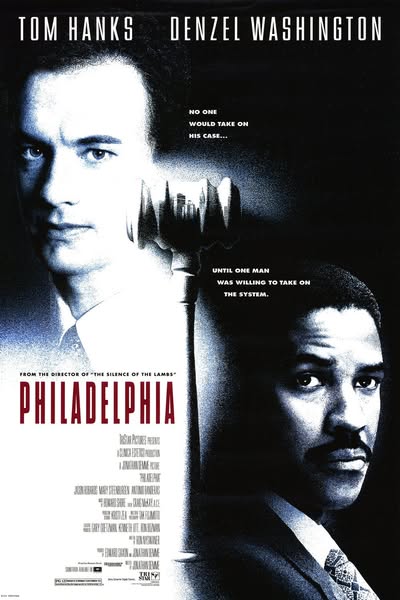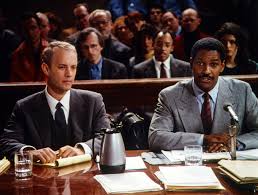Philadelphia (1993)

Philadelphia (1993) is a groundbreaking drama directed by Jonathan Demme, notable for its poignant exploration of discrimination, love, and the human experience in the face of a devastating health crisis. The film stars Tom Hanks in a career-defining role as Andrew Beckett, a talented attorney who is fired from his prestigious law firm after his employers discover he has AIDS.
The narrative follows Andrew’s fight against the wrongful termination and discrimination he faces due to his illness. The film not only sheds light on the stigma surrounding AIDS in the early 1990s but also addresses broader themes of homophobia and societal prejudice. Hanks delivers a powerful performance, capturing Andrew’s vulnerability, strength, and dignity as he navigates the challenges of his diagnosis and the legal battle that ensues.

Denzel Washington plays Joe Miller, a personal injury lawyer who initially harbors his own biases but ultimately becomes Andrew’s staunch advocate. Their evolving relationship forms the emotional heart of the film, illustrating the transformative power of compassion and understanding. Washington’s performance is equally compelling, showcasing his character’s growth as he confronts his own prejudices and learns to empathize with Andrew’s plight.
Philadelphia is notable for its honest and unflinching portrayal of the realities of living with AIDS. The film captures the struggles faced by those affected by the virus, including the physical and emotional toll it takes on individuals and their families. The script is poignant, weaving moments of humor, heartbreak, and hope throughout the narrative.

Visually, the film employs a straightforward yet impactful style, allowing the performances to take center stage. The cinematography effectively captures both the personal and legal battles of the characters, enhancing the emotional weight of their experiences. The score, composed by Howard Shore, underscores the film’s themes, adding depth to pivotal moments.
The film’s release marked a significant cultural moment, bringing attention to the AIDS epidemic and the discrimination faced by the LGBTQ+ community. It played a crucial role in raising awareness and fostering dialogue about these pressing issues, making it a landmark in both cinema and social advocacy.

In summary, Philadelphia is a powerful and moving film that confronts difficult topics with sensitivity and honesty. With exceptional performances, a compelling narrative, and a commitment to social justice, it remains a vital work that resonates with audiences, encouraging empathy and understanding in the face of adversity. The film stands as a testament to the enduring human spirit and the importance of fighting for equality and dignity.











